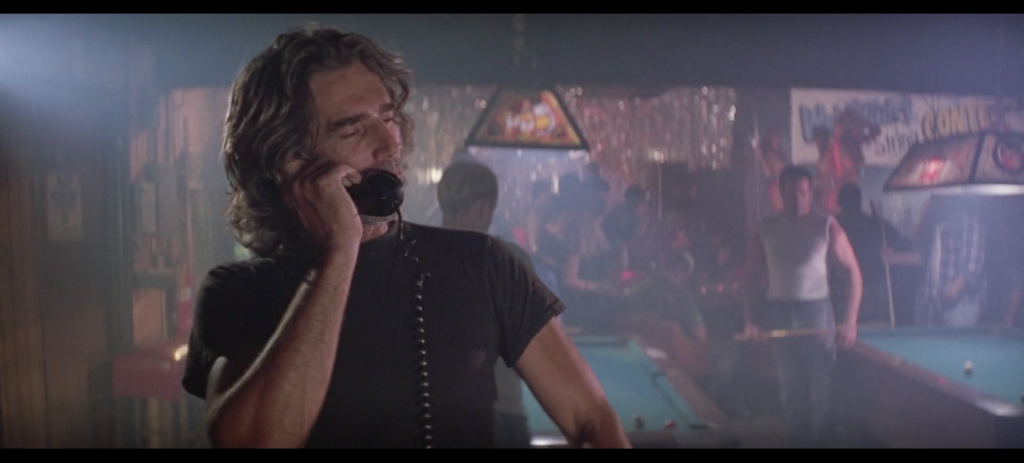“What’s goin’ on, mijo?”
This is how Wade Garrett opens his phone conversation with Dalton, the first exchange the student and the master have in the film. Mijo is the term of endearment with which Wade refers to Dalton throughout the film. Mijo means “son.”
I wouldn’t read too much into that if hahahaha just kidding, boy oh boy is this a fecund (virile?) word choice! This kind of affectionate diminutive is of course common to men of a certain age when addressing younger men. It’s certainly common in Road House. O’Connor, the Bleeder himself, calls Dalton “son” prior to this exchange. Brad Wesley refers to the men he pays to beat people and destroy property for him as “my boys.” On the flip side, Morgan sneeringly calls Wade “Dad” when they jump ugly upon Wade’s arrival in Jasper. Fatherless sons and sonless fathers in this movie, almost to a man.
Let’s step back for a moment though. Whatever the implication of the term, Road House is emphatically not some sort of prophetic look at the future of nerd culture, in which daddy issues are the prime motivator for fiction, both in terms of what the fiction is about and the men who write it, most of whom have few thoughts in their head deeper than “You shouldn’t have yelled at me for staying inside to read The Incredible Hulk instead of playing pee-wee league football, Dad.” I just find it hard to believe that, for example, people stranded on a mysterious island with extraordinary powers, supernatural threats, and a relict science cult only want to look upon the faces of their fathers again, or that the Alien franchise is improved by recreating the Genesis/Frankenstein creation myth with Michael Fassbender instead of leaning hard into the birth-phallus nightmare Giger gifted poor idealess Ridley Scott with back in the day, or…I dunno, I think Chris Pine Captain Kirk is really worried about his dad for some reason in those Star Trek movies.
What does this have to do with Road House, you might ask? On one level, nothing, I’m just getting a few licks in on the sentimental excesses of JJ Abrams & Damon Lindelof. But what I’m really trying to say is that the actual father-son dynamic, in terms of a younger man rebelling against but ultimately (in nerd-culture usage anyway; rebellion against the father is always a mistake) looking up to an older man who offers him guidance, remonstrance, and ultimately approval, and an older man needing a younger man to live through vicariously, help avoid painful mistakes, and wrestle with being supplanted—that’s not here. Whatever the age difference (“Wade Garrett’s getting old”), Dalton and Wade are peers at this point. The advice Wade gives him is not much more paternalistic than that given to Dalton by Elizabeth or Emmett, or by Dalton to the employees of the Double Deuce and the small businessmen of Jasper, all of whom are his senior by a wider margin than Wade.
Mijo is rather applicable in two other ways. First there’s the “all these bitches is my sons” Nicki Minaj spin on it, sans the pejorative implication. The Dalton Path is directly descended from the Way of Wade Garrett. Dalton brings his own philosophical spin to things, but from their rangy fighting styles to their emphasis on both emotional and physical efficiency they’re father and son alright.
The second is a bit trickier to unpack, or unzip as it were. If Dalton is Wade’s son, Wade must needs be Daddy. Again, I don’t think this usage applies to Dalton himself, except perhaps with third-party women like Elizabeth as a proxy. I do know that the Doc clearly has Wade up on the exam room table of her mind within about two seconds of seeing him for the first time, and that the night is still young when Wade first shows her, the girlfriend of his best friend and student, his pubic hair. Wade isn’t into the Tumblr Daddy Dom suit-and-tie capitalist-pig shit, not at all. He simply has the steady hand, stubbly chin, and built-for-action body of a man who’s used to being in charge. For every mijo, there is an equal and opposite papi.
Tags: dalton, mijo, road house, wade garrett

